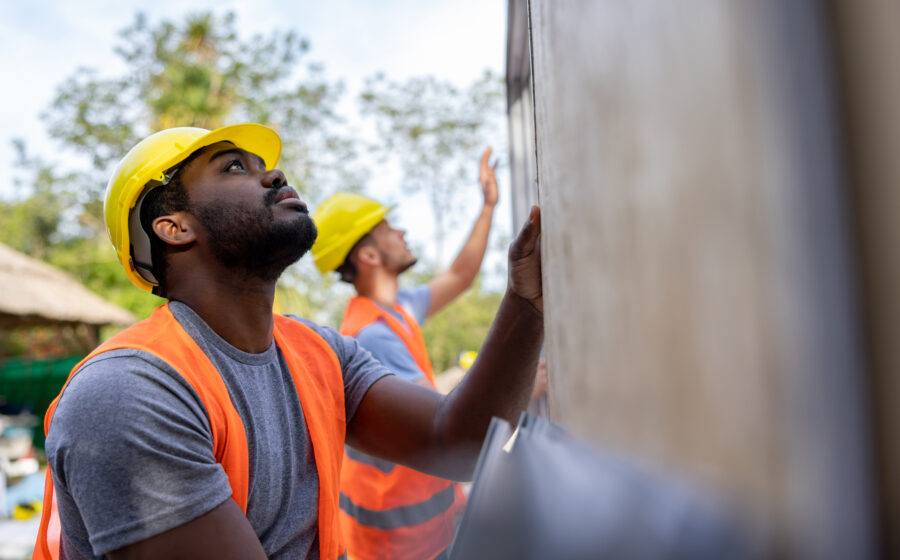When you begin a construction project, you never intend for it to result in a lawsuit. However, due to the high-risk nature of construction, lawsuits are common. To protect against this potential financial impact, contractors need to carry adequate construction liability insurance.
General Liability Insurance for Construction
When you think about construction liability insurance, general liability insurance for contractors may be the first policy type to come to mind. In fact, in many states and municipalities, contractors are required to maintain general liability insurance as part of their licensing.
Commercial general liability insurance can provide protection against financial losses if your business is liable for bodily injury, property damage or personal and advertising injury caused by your services, operations or employees. In addition to covering legal costs in the event of a lawsuit, commercial general liability (CGL) insurance can also cover medical payments without a lawsuit, up to a certain amount.
A general liability insurance policy provides important protection for contractors and construction businesses. Here are just a couple of examples of how it could be used:
- Your construction company is doing renovations on a house. While working, your crew accidentally leaves a tool on the sidewalk. A neighborhood child hits the equipment while riding a bicycle and is injured. The parents sue your company for the medical costs.
- Your company is using a crane on a construction site. One night, a windstorm blows the crane over, causing property damage to a building and several cars in the area. Your company is now facing multiple lawsuits involving substantial property damage.
- One of your projects requires welding. A fire starts and spreads to a nearby building. The owner of the building filed a lawsuit against your company.
Learn More About Construction Insurance Coverage
General Liability Coverage for Completed Operations
In addition to securing commercial general liability insurance coverage for ongoing operations, contractors may also need liability insurance for completed operations.
Once a project is completed, you might think your liability is over, but that’s not necessarily the case. A defect in your workmanship could cause injury or property damage. For example, let’s say your company builds a deck for a homeowner. Several months later, the deck collapses, injuring two people who were standing on the deck at the time. Construction projects that involve electrical work are also very vulnerable to completed operations claims due to the risk of fire from faulty wiring.
Other Types of Liability Insurance for Construction Businesses
Although commercial general liability insurance provides important coverage for contractors, it does not cover all liability risks. Notably, contractors’ general liability insurance only covers non-professional liability claims stemming from third parties. Claims involving the contractor’s employees or property are not covered. Certain other losses, such as losses involving pollution or auto collisions, may also be excluded. However, these risks can be covered with other commercial insurance products.
Workers’ Compensation
Employers are typically required to carry workers’ compensation insurance, and doing so protects them from financial liability if a worker is injured on the job. According to the National Safety Council, construction is the most dangerous industry in terms of the number of workplace deaths. Nonfatal injuries are also common and can lead to claims involving medical care and lost wages, making workers’ compensation vital coverage for a business involved in the construction industry.
Commercial Auto Insurance
States also typically require auto insurance for all vehicles, including both personal and commercial vehicles. For businesses, having sufficient commercial auto liability coverage is especially important due to the risk of massive jury awards, often called nuclear verdicts, and the overall increase in jury awards, often called social inflation. The Insurance Information Institute says social inflation resulted in an extra $30 billion in commercial auto liability claims between 2012 and 2021.
Contractors’ Professional Liability Insurance
Generally, contractors’ professional liability insurance covers errors or omissions specifically related to project design. This protection is important for contractors with design-related exposures. Do not assume that you don’t have any design-related risks just because you don’t employ architects. If you create or contribute your expertise to project plans, you may have exposure, so talk to your insurance broker to determine the best coverage plan for your business.
Contractors’ Errors and Omissions Insurance
Although professional liability insurance and errors and omissions (E&O) insurance are often used interchangeably, contractors’ E&O insurance is actually quite different from contractors’ professional liability insurance. Policies are nonstandard and can therefore vary significantly, but among other things, E&O coverage typically applies to property damage to the insureds’ work/product, which is typically excluded by their general liability policy. For example, if an electrician’s error resulted in a fire, damage to the building would be covered by the CGL policy, but damage to the electrical work/product would not be covered unless the contractor carried E&O insurance. If the fire was the result of faulty plan design, then professional liability insurance could come into play.
Cyber Liability Insurance
Construction sites are becoming increasingly high-tech. As a result, the risk of a cyberattack is also increasing. For example, a ransomware attack could put connected equipment offline and force operations to stop. A report from the Dodge Construction Network found that 70 percent of general contractors had experienced a cybersecurity threat in the last two years and 30 percent experienced a ransomware attack. Cyber liability insurance can help you deal with the financial impact of a cyber incident and speed up the recovery process in order to return to normal operations.
Contractors’ Pollution Liability Insurance
Commercial general liability insurance typically excludes pollution and environmental claims. Construction work can often involve pollution exposures, so contractors’ pollution liability insurance, also known as environmental liability insurance, can provide important coverage. Pollution insurance typically covers claims involving environmental-related exposures, such as mold or asbestos contamination, cleanup operations, bodily injury, property damage and business interruption.
Employment Practices Liability Insurance
Employees and job seekers may file a lawsuit if they think their rights have been violated. For example, if you have to lay off workers, some workers may feel they were targeted because of their race, sex or other protected class, even if they weren’t. Employment practices liability insurance can provide coverage for many common employment-related claims, such as sexual harassment, discrimination and wrongful termination.
Umbrella Liability Insurance
If your business were to face a lawsuit, the awards can be astronomical. As a result, it’s difficult to determine how much coverage is enough, and your various coverage limits may not be sufficient. Commercial umbrella insurance adds an extra layer of liability coverage on top of your underlying policies. This can be a cost-efficient way to boost your liability coverage.
Talk to a Construction Liability Insurance Specialist
Additional Business Insurance for Your Construction Project
While it’s important to cover your liability exposures, you also need to cover the risks to your own property and projects. In addition to various liability coverages, you may need commercial property insurance, equipment breakdown coverage, builders’ risk insurance or inland marine insurance. For large projects, a contractor-controlled insurance program (CCIP) may make sense.
Of course, you don’t want to purchase insurance policies that you don’t need, but you don’t want to regret not having the coverage you need, either. An insurance broker can review your insurance needs to identify gaps that need to be filled while helping you avoid unnecessary costs.
Higginbotham can help you obtain the construction insurance you need, including construction liability insurance. We also provide construction loss services and safety training to help you avoid losses and control your insurance costs. Talk to a member of our team today.






